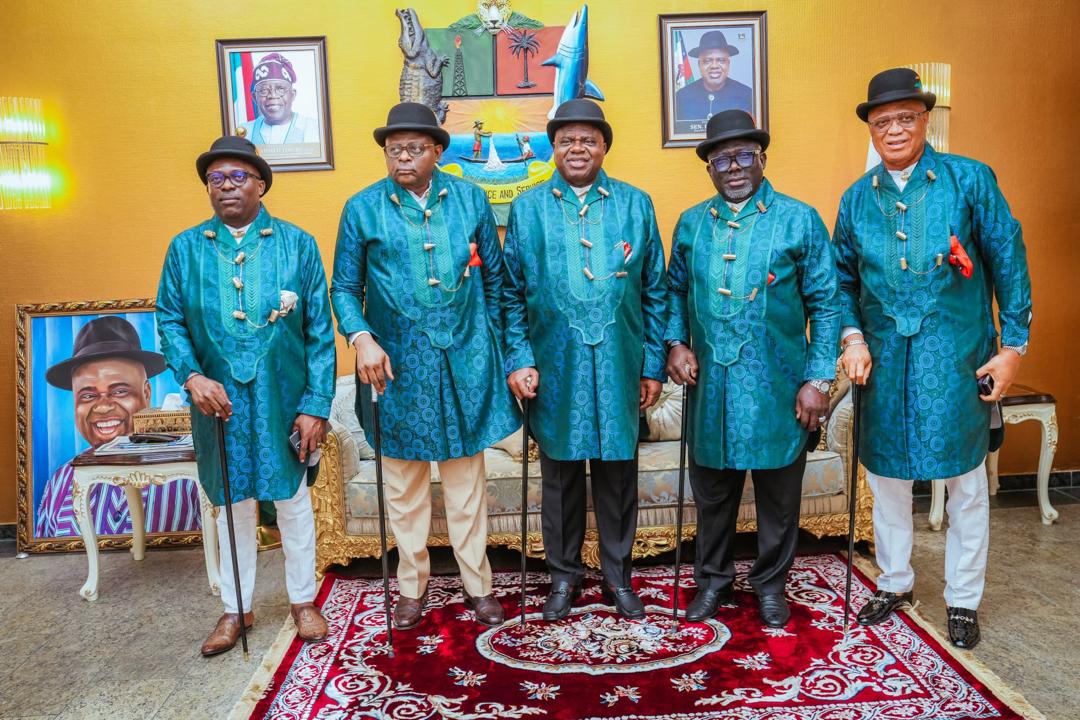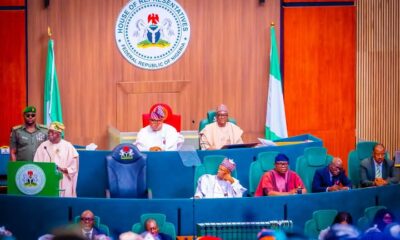News
Rivers Legislators Seek Extension Of Pipeline Surveillance Contract
Some members of the Rivers State House of Assembly have called on the Federal Government to extend the surveillance contract of Pipeline Infrastructure Nigeria Ltd (PINL) beyond the current three months.
The lawmakers include Rt. Hon. Dumle Maol; Hon. John Dominic Iderema; and Hon. Sokari Goodboy Sokari; representing Gokana, Abua/Odual and Ahoada West constituencies, respectively,
This is as the lawmakers have rated the company high on its performance on the pipeline surveillance contract across affected Niger Delta states.
PINL is one of the contractors engaged by the Federal Government to implement its security surveillance policy of oil industry assets, especially pipelines, in the Niger Delta.
The contract, which has just lasted nearly a year, has PINL covering hundreds of communities in four states of Abia, Bayelsa, Imo and Rivers, hosting pipelines and other crude oil assets.
But following the ravaging effects of oil theft, pipeline vandalism and illegal refining, the Federal Government resorted to the policy of pipeline surveillance with PINL being one of the contractors.
Records show that gross terminal recovery factors have moved from 3% in 2022 to over 97% as at May 30, 2023, attributable to PINL strategic deployment and operations in the Eastern corridor.
Recently, the contract was renewed by the Federal Government by another three months with expiration date set for sometime in October, 2023.
Speaking to journalists on the performance of the contractors, the three lawmakers, whose constituencies are oil facility hosts, expressed joy with PINL for its high quality performance, stating that the company has reduced oil theft through pipeline vandalism and illegal refining of petroleum products by over 90 percent in its short period of engagement.
They attributed the success of the company to its far-reaching community engagement strategy through which they touched base with all host community stakeholders of pipeline and other facilities, saying it gave everyone a sense of belonging and made them active participants in the fight against the menace of illegal oil bunkering.
The lawmakers, therefore, urged the Federal Government to extend the surveillance contract, saying that the three months extension recently granted the company was not long enough.
They warned that if the contract was not further renewed, the oil thieves might return at the end of the extended three months.
In his statement, the lawmaker representing Gokana State Constituency and Deputy Speaker, Rivers State House of Assembly, Rt. Hon. Dumle Maol, acknowledged that the presence of PINL in his area has saved the people from the multi-dimensional challenges of oil thieves and illegal bunkering.
Maol, who represents a part of Ogoniland with several kilometers of pipeline, said; “I hear that they were told to be on site for another three months, meaning that in days to come, their contract will elapse.
“Question is, if you don’t ask them to continue, what will happen to the place? It will be vulnerable for these crude oil thieves to come back and do what they used to do before, and we don’t intend to go back to the dark days.
“I believe that asking them to come back will mean that they need to double their efforts and bring new innovations that will make them improve and do better than what they are doing now.
“Before now, it had been an eye sore. In my community, B-Dere, it used to be horrible, when you see individuals just wake up one morning and go to destroy pipelines all in the guise of getting crude oil for illegal refining.
“So, I urge the Federal Government to quickly do the needful by extending the contract in a sustainable term, not three months, not one month but a long term award that will make them relax and think of what to do to sustain what they are already doing”, the lawmaker added.
Also speaking, Hon. Iderema said, “If tremendous progress has not been made, I don’t think Mr President would have extended it by three months. For him to have extended the contract by three months, it means he’s satisfied with PINL activities in the Niger Delta.
“Now, for me, the three months period is too short because once they know that PINL is leaving in three months’ time, they too will be prepared. That very day that the company pulls out, they will move in and start their illegal activities again.
“I’m proposing for the Federal Government to give them, at least, one year period of probation again. Whoever the Federal Government wants to monitor PINL, they should bring the person to monitor them for a period of one year, at least. Three months is too short.
“For me, going by what we had before they came in, I don’t think anybody would want to change a football team that’s winning, they would want to sustain such football team. So, I believe that the Federal Government will want to strengthen this PINL so they can achieve greater heights”, Iderema stated.
“Before 2022, pipeline vandalism was a real menace to the two local government areas” of Abua/Odual and Ahoada East.
“It was terrible, it was a big problem for the state and the society. People died, it was becoming unbearable. The soot alone, you can’t fetch water and leave it open for 5 minutes. You know, in these localities, we have open bathroom.
“So, by the time you fetch water from the tap or from the mono pump, by the time you finish bathing, you will notice oil with particles, which we learnt contains benzine and it can cause cancer.
“You can’t have natural air to breathe, you can’t open your windows because by the time you open your windows and touch your plates or cutlery, you see black soot. Then, it became a permanent stain on the soles of our feet. That was hazardous, it was a big problem, but with the contract in place, things have changed for the better”, Iderema noted.
On his part, Hon. Sokari said; “Honestly speaking, vandalism or oil bunkering has affected us so much as a people. The activities of these illegal bunkerers and refiners have affected our land. It has disrupted the ecosystem and negatively impacted on agriculture which is the main occupation of my people.
“Before now, we don’t know if there was any arrangement between the government and the private sector on how to safeguard these facilities, but lately, we have seen some changes; and that move has drastically reduced illegal refining activities that we see around our area”.
Sokari said; “Initially, when they came, we felt it was going to be a kind of recurring decimal. We didn’t know that it will work. PINL moved straight to wherever they were and life became unbearable for them and they had to leave.
“If I’m to score them between 1 and 100, I will give them 90 percent and above. For PINL to have made the youths of these communities engaged, they are happy. They are gainfully employed; they get salary every month. So, that also is a plus for PINL”.
News
Let’s Approach Regional Development Issues Differently – Fubara …As S’South Govs Host Fubara To 50th Birthday Celebration

Rivers State Governor, Sir Siminalayi Fubara, has sued for a change in the current approach adopted by South South Governors in their pursuit to achieve holistic regional development and economic prosperity.
The governor insisted on de-emphasis in vested individuals’ political interests while looking at the bigger picture of achieving enduring regional integration that will strengthen unity of purpose to change the trajectory of development in the region.
Fubara made the appeal during the meeting of Governors of South-South States, under the auspices of BRACED Commission, at the Bayelsa State Government House in Yanagoa on Tuesday.
This was contained in a statement by the Chief Press Secretary to the Governor, Nelson Chukwudi.
BRACED is an acronym for Bayelsa, Rivers, Akwa Ibom, Cross River, Edo and Delta.
He said: “I want to appeal that if we have to succeed in this drive, we need to keep our political differences aside and understand that the struggle, as at today, is for posterity, for the development of our region.
“It is really sad that in Niger Delta that is the economic base of this country, the construction of a road that you tagged ‘East-West Road’ could be an issue, that we need to beg, protest, and complain to get it fixed. I don’t think it is proper.”
Governor Fubara stated that it is not that the federal authorities do not understand that Niger Delta needs the road but quickly added that they have seen that even the people of the region do not take themselves seriously.
The governor said the moment Niger Delta people stopped playing to the gallery, and place value on themselves, outsiders will have no option than to accord the region and its people due regard.
Fubara said: “On my part, I want to say this: This is not the first time we are meeting. For me, I followed the course of the region meeting in a forum that we tagged “BRACED Commission.”
“BRACED Commission is also one of the bodies that was constituted at that time to support and work out development strategies for this region. But what I am seeing today is just limiting this meeting to only BRACED COMMISSION.
“We need to widen the scope where other leaders of the region should be part of the discussion of the development of the region, and I think this is the direction that will help the region.”
Reading the Communique of the meeting, the new Chairman of the Forum of Governors of South-South States, and Governor of Bayelsa State, Senator Douye Diri, said they support the Federal Government Tax Reform Bills, and urged President Bola Tinubu to extend the Value Added Tax (VAT) sharing percentages to oil and gas derivation.
He stated the Forum’s request to the Federal Government to urge relevant stakeholders and agencies to extend remediation of polluted environment ongoing in Ogoni land to other impacted communities and States in the region.
Governor Diri also said that the Forum resolved to establish a structural regional security network to enhance safety and security, foster stable Niger Delta region conducive for economic growth and prosperity.
Highlight of the event was the hosting of Governor Fubara to a surprise 50th Birthday celebration by the Governors of South-South States at the Government House in Yenagoa.
News
Fubara Lauds Tinubu For Setting Up Education Load Fund … Vows To Ensure Rivers Benefit Maximally From Scheme

The Rivers State Government has applauded President Ahmed Bola Tinubu for conceiving the idea of setting up the Nigeria Education Loan Fund (NELFUND) which has opened up opportunities for youths to acquire tertiary education irrespective of their financial status.
Rivers State Governor, Sir Siminalayi Fubara, gave the commendation while playing host to a delegation from NELFUND who came on an advocacy visit to the Government House in Port Harcourt on Tuesday.
Represented by his deputy, Prof. Ngozi Nma Odu, Governor Fubara said in developed countries it is common for people to go through school with loans which they sometimes pay all throughout their lives, noting that “for us, it is more accessible and more friendly because you would be required to pay back the loan two years after your National Youth Service.
“It is a win-win situation; it is a situation where the youths in Nigeria should not say because my parents are poor or passed away I cannot improve on my educational growth. This offers them a golden opportunity and I am glad you came for this advocacy.”
The governor urged NELFUND to intensify its advocacy to let the people know how they can benefit from it, adding that it is more important when talking about vocational institutions.
“If you look at the developed countries it is people that went to the vocational schools that make so much money, because it is pricey to get somebody to do anything, we need to instil this into our people, our youths, because people sometimes tend to look down on people that went to vocational schools, it should not be,” he said.
Fubara expressed delight with the NELFUND programme and assured that the State Government would do whatever it can to ensure Rivers State benefits maximally from the scheme.
In his remarks, the Managing Director and Chief Executive of NELFUND, Dr. Akintunde Sawyer, informed the governor that they were in Rivers State to seek the support of the State Government towards the loan, stressing that President Tinubu has directed them to ensure no Nigerian student who has the ability and desire to get educated at tertiary level is denied the opportunity due to lack of funding.
He explained that the scheme provides interest-free loans to students who apply, adding that these loans are not repayable until two years after their Youth Service when they must have gotten a job.
News
UK Appoints British-Nigerian As Trade Envoy To Nigeria

A British-Nigerian politician, Florence Eshalomi, has been appointed as the United Kingdom’s trade envoy to Nigeria.
Her appointment makes Eshalomi the second Nigerian to hold the position.
Confirming her appointment on X on Tuesday, she wrote: “It is an honour to have been appointed as the United Kingdom’s Trade Envoy to Nigeria.
“I’m looking forward to building on my close ties with Nigeria to promote a strong and flourishing economic relationship between our two great nations.
“I am looking forward to strengthening the UK’s relationship with Nigeria to explore shared growth and opportunities for both countries.”
Announcing the appointment in a statement on Tuesday, Jonathan Reynolds, the UK’s Business and Trade Secretary, said the decision was aimed at attracting investment into the UK and boosting economic growth.
“I’ve launched a new team of trade envoys who will use their experience, expertise, and knowledge to unlock new markets around the world for British businesses, attract investment into the UK, and ultimately drive economic growth,” Reynolds said.
Eshalomi, 44, is an MP representing the Vauxhall and Camberwell Green constituency.
She holds a Bachelor of Arts (Hons) in Political and International Studies with Law from Middlesex University.
-

 Featured3 days ago
Featured3 days agoFG Suspends Max Air Operations For Three Months Over Kano Incident
-
Nation3 days ago
Rivers CP Eulogises LG Boss Over Donation Of Vehicles
-
Politics3 days ago
Assembly Declares Lawmaker’s Seat Vacant Over Alleged Absenteeism
-
Business3 days ago
Aviation Stakeholders Raise Alarm Over NCAA Appointment Saga …Harp On Safety
-
Opinion3 days ago
Fubara @ 50: Golden Sparkles And Magic Bullet
-

 Featured3 days ago
Featured3 days agoTinubu Seeks Multifaceted Response To Terrorism, Other Security Threats
-
Nation3 days ago
N4bn Seized Assets, Arrest Of Kano Anti-Corruption Chair, Magaji, Raise Fresh Dust
-
Politics3 days ago
Celebrate Patriotic Citizens, Not Corrupt Politicians, Babalola Tells FG, States

